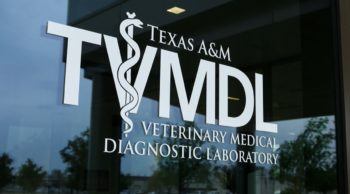TVMDL working to protect dogs and cats from heartworm disease
Basics of heartworm disease testing
Summer is growing closer and as the weather begins to warm up, mosquitos will become more active.
The Texas A&M Veterinary Medical Diagnostic Laboratory, TVMDL, wants Texans to know that, along with myriad other diseases and issues, mosquitos are the causative agent behind one of the issues some pet owners fear most, heartworm disease.
Heartworms: how are dogs and cats affected?
According to the American Heartworm Society, heartworm disease is caused by parasitic worms transmitted to animals through mosquitos. Mature heartworms can live within dogs for up to seven years and up to three years in cats.
Once infected, dogs and cats experience heartworm disease differently.
Clinical signs in dogs are generally based on the total number of heartworms present. Dogs may have a persistent cough and tire easily following mild to moderate exercise if heartworms have only caused mild damage to the arteries leading from the heart to the lungs.
As damage progresses, a dog’s blood flow may be disrupted and cause heart failure. Dogs may also suddenly die if a large number of worms are blocking the flow of blood to the heart.
Cats experience heartworm-associated respiratory disease, HARD, which involves coughing, wheezing, respiratory distress and sometimes sudden death. Whereas dogs tend to have a large adult worm burden with signs related to obstruction, cats typically have very few adult worms (e.g. 1-3) but experience signs related to a hypersensitivity reaction.
Testing to detect heartworms in cats and dogs
The Texas A&M Veterinary Medical Diagnostic Laboratory offers different methods of detecting heartworms in both cats and dogs.
For cats, TVMDL’s serology section offers a panel consisting of two different tests that can detect heartworms at different maturity stages. The feline heartworm antibody test detects antibodies the cat makes to the larval stage mosquitos inject when they feed. However, these larval stages may die en route to the heart and never actually develop into adult heartworms. The other test, TVMDL’s heartworm antigen test, can be used for both cats and dogs. Because cats are a challenge to diagnose with adult heartworms, having both results helps veterinarians piece together a cat’s heartworm status.
For dogs, TVMDL offers two different approaches to testing.
The first approach is to detect microfilaria, i.e. heartworms, while they are still in the infant stage of their lifecycle. TVMDL’s clinical pathology section can detect microfilaria using either a filter method or through a modified Knott’s test to detect and identify heartworm microfilaria.
This stage is produced by adult heartworms and is the stage the mosquito picks up when feeding on infected dogs. This test is typically performed for screening purposes to determine if heartworms are present in dogs that have never been on heartworm preventative medication or in dogs that have been off preventative medication for a long period of time.
The second testing approach is using an enzyme-linked immunosorbent assay, ELISA. Technicians in the serology section use the ELISA test to detect antigens that are associated with pregnant female heartworms. A positive result indicates adult female heartworms are present. This is the primary testing method used to detect heartworms.
TVMDL’s role in testing for heartworms
Most private veterinary clinics can perform heartworm antigen testing in-house. As such, TVMDL primarily conducts confirmatory heartworm testing, with a different antigen test, after these clinics have gotten an initial positive result.
Confirmatory testing is typically performed for one of two reasons. The first reason is to confirm a dog is positive for heartworms prior to undergoing treatment. The drug used in the treatment of heartworms can have severe negative side effects and shouldn’t be used unless adult heartworms are present. Unfortunately, there is no adult heartworm treatment approved for cats – cats can only be treated for their symptoms.
The second reason to conduct confirmatory heartworm testing is to document heartworm prevention failure. Many pharmaceutical companies will pay for the treatment of heartworms, but require an outside, independent laboratory to confirm a positive heartworm test.
Although TVMDL serves in a confirmatory role for most antigen heartworm tests, the agency typically conducts initial testing for the heartworm antibody test in felines. Due to the infrequency with which this test is requested in private practice, many veterinary clinics do not perform this test in-house and defer testing to TVMDL.
In total, TVMDL performed over 500 heartworm tests last year, of which over 400 were antigen tests performed on both dogs and cats.
| Negative | Positive | Overall Total | |
| Dirofilaria immitis Antibody – Feline (Lateral Flow) | 96 | 4 | 100 |
| Dirofilaria immitis Antigen (ELISA) | 408 | 151 | 459 |
| Overall Total | 504 | 155 | 559 |
Additional diagnostic recommendations for cats
For feline patients, TVMDL suggests veterinarians use radiographs as an additional diagnostic tool. It’s difficult to diagnose feline heartworm disease solely through blood testing, and radiographs may provide useful information.
Prevention recommendations
TVMDL encourages veterinarians to educate their clients on the benefits of giving year-round heartworm preventative to both their canine and feline patients. Missing a dose, or even administering a dose late, may allow a window of opportunity for mosquitos to infect pets.
For additional information on heartworm disease, visit the American Heartworm Society’s website. To learn more about TVMDL’s testing services, visit their website or call the TVMDL laboratory nearest to you.



